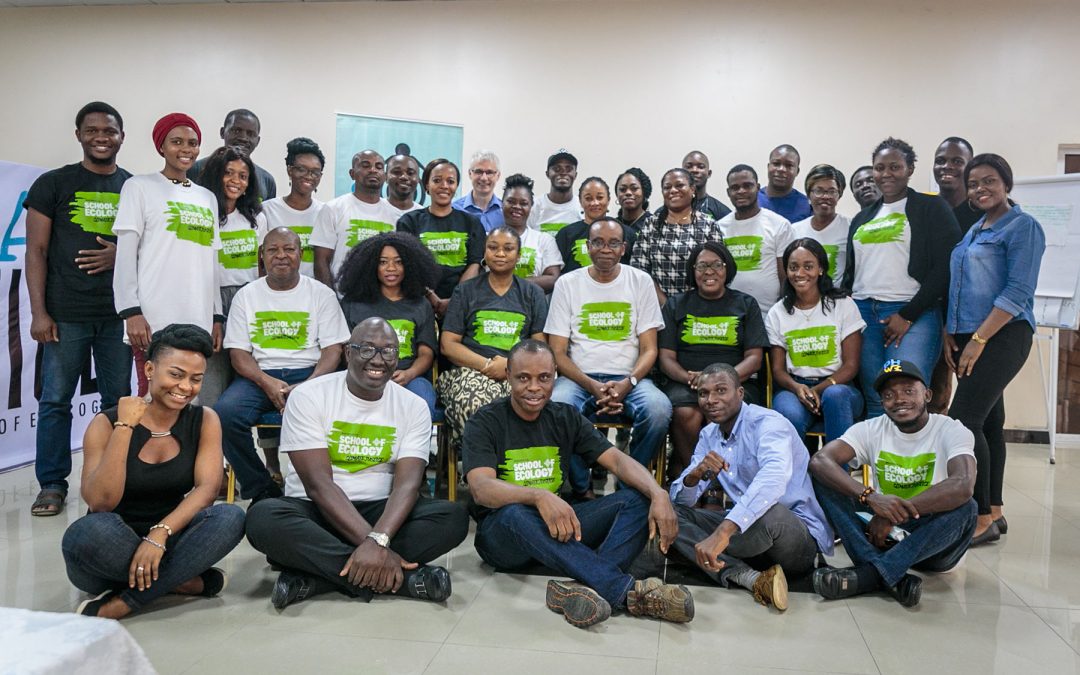Health of Mother Earth Foundation held the 3rdsession of her School of Ecology on Climate Justice in Uyo, Akwa Ibom State, 8-10 July 2019. The school featured intense interactions and interrogations on issues of climate change – the impacts, major contributors, the politics, false solutions – and the way forward for climate justice.
Scholars were selected through a very competitive process and included university students, professionals, climate change activists, and civil society organisations from across the country. The session also had representatives from the Akwa Ibom State Ministry of Environment and from the Climate Change Department of the Federal Ministry of Environment.
At the opening of the session, Mrs Comfort Asuquo representing the Akwa Ibom Ministry of Environment remarked that this event was apt and timely. She noted the ministry concerned about the issue of climate change and as part of actions to address it, a department has been created recently in the State specifically for issues of Climate Change and a lot of sensitization is going on about it.
Mrs Iniobong Abiola-Awe, the Deputy Director at the Climate Change Department of the Federal Ministry of Environment gave a presentation on Climate Politics (The UNFCCC, COPs, National Actions and Climate Finance). She pointed out that although the issues of climate change are global, we must take local actions seriously. She added that it is essential for climate activists to have accurate information about public climate action and that the offices of the Department of Climate Change and the Ministry are open to give such information.
The Director of HOMEF, Nnimmo Bassey in his welcome remarks quoted the words of Thomas Sankara: “You can fight effectively only against things that you understand well, and you can’t win unless you are convinced your fight is just.” He explained that we have a duty to understand the root causes of climate change, to understand the unjust distribution of its impacts and why just solutions must be implemented. He added in his presentation on Climate Justice: Grassroots Solutions, Energy and Resource Democracy, and Systemic Change, that placing monetary value on Nature locks in the market mindset, promotes insatiable consumption of its resources and encourages further destruction. He called for a collective concern and for effort to build wellbeing and to free the world of all forms of exploitation.
Amongst several other presentations, Duncan McLaren, a professor at Lancaster University, United Kingdom, and Ken Henshaw a researcher and consummate activist, spoke extensively on false solutions to climate change such as geoengineering, carbon trading, genetic engineering, REDD+, as well as on the well-being economy. It was pointed out that efficient solutions are those that tackle the issues from their roots-which is predicated on the elimination of greenhouse gasses emissions by fossil fuels based activities..
Babawale Obayanju an environmental justice campaigner and communications expert, spoke on Climate Action: Youth Engagement and Environmental Justice Defence. He stated that youths have to do more in advocating for climate justice as their future is seriously threatened. He added that to encourage youth activism on climate justice there must be extensive environmental education and capacity building.
On the way forward for climate justice, Ifeoma Malo, Executive Director of Clean Technology Hub, Nigeria and country director of Power for All, spoke elaborately on the need to transit to renewable energy use and on practical steps towards it. According to Malo, the world is fast moving from the use of fossil fuel energy and soon there will be no market for our oil. She advised that Nigeria must quickly take steps towards setting up renewable energy alternatives such as solar energy systems.
Joyce Ebebeinwe, HOMEF’s project Officer on Hunger Politics also spoke on need to adopt and promote the Agroecology system of agriculture as this has been demonstrated to ensure increased food productivity, economic stability and climate resilience.
At the close of the session, participants made individual commitments to action for climate justice and the following general resolutions were made.
- Climate change impacts are now more evident than ever. A major contributing factor is the green-house gases emissions from the oil sector. Nigeria should quickly begin a Just Transition from the dependence on fossil fuel energy.
- A major reason we don’t have appropriate climate action is the influence of corporate interests. To achieve climate justice we must change our system-our social and political relations.
- Gas flaring must be stopped. There should be no more shifting of flare-out deadlines. Polluters must be made to pay commercial value of gas as an encouragement to halt bad behaviour.
- The world is moving away from fossil fuel energy to clean energy technologies and the demand for fossil fuels is reducing. Nigeria must quickly take steps towards a renewable energy future.
- We must demand climate change solutions that address the root of climate change and reject all false solutions including market based ones such as REDD+, Carbon Trading, Carbon Capture, Geoengineering and Genetic Engineering masked as Climate Smart Agriculture.
- We should promote and fundamentally shift towards Agroecology to ensure resilience to the impacts of climate change and the stabilization of the climate by reducing CO2 emissions in the atmosphere.
- We must build critical youth movements across the country to advocate for climate action.
- Our educational curriculums should include energy transition, climate justice, renewable energy, and agroecology.
- We should have multi-stakeholder engagements-dialogues, protests and possible mitigations to provoke climate action.
- We must urgently install mass transit systems and promote the use of renewable energy cooking and storage equipment for women and communities.
- We must rethink our idea of development which is now measured based on Gross Domestic Product (GDP). Our thinking should focus instead on the wellbeing of the people with dignity and fairness for humans and the rest of nature.
- Civil Society Organisations should monitor our Nationally Determined Contributions (NDCs) to ensure their effective and timely implementation for climate action.





